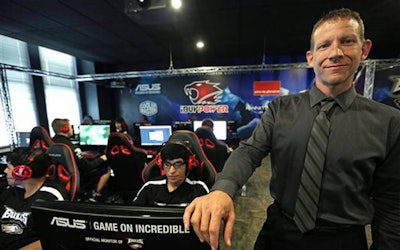 Kurt Melcher
Kurt MelcherCHICAGO ― As a teenager, holed up in his bedroom, illuminated by the glow of his laptop, Youngbin Chung became addicted to video games. Ten-hours-a-day addicted.
His grades tanked. His parents fretted.
A few years later, the 20-year-old from the San Francisco area leads a team of headset-wearing players into virtual battle in a darkened room at a small private university in Chicago. He’s studying computer networking there on a nearly $15,000 a year athletic scholarship ― for playing League of Legends, the video game that once jeopardized his high school diploma.
“I never thought in my life I’m going to get a scholarship playing a game,” said Chung, one of 35 students attending Robert Morris University on the school’s first-in-the-nation video game scholarship.
Once regarded as anti-social slackers or nerds in a basement, gamers have become megastars in what are now called esports. In professional leagues, they compete for millions of dollars in prizes and pull in six-figure incomes for vanquishing their enemies in what have become huge spectator events packing tens of thousands into sports stadiums around the world.
Games have evolved from the days of Pac-Man and Donkey Kong into something much more complex. They demand hyper mental acuity and involve multiple players communicating with each other in teams, plotting strategy, predicting opponents’ moves and reacting in milliseconds.
Robert Morris, a not-for-profit university with about 3,000 students, believes those are not so different from the skills one uses on a football field or a basketball court and that spending money to recruit these students, too, will enrich campus life and add to its ranks of high-achieving graduates.
“It’s coming; it’s coming big time,” Kurt Melcher, Robert Morris associate athletic director, said of the esports trend and what he’s sure is its looming recognition by a bigger chunk of the collegiate sports world.
Hundreds of other colleges and universities have esports clubs, but Robert Morris is the first to recognize it as a varsity sport under its athletic department. The scholarships, which cover up to half off tuition and half off room and board (worth a total of $19,000 in a typical three-quarter academic year) are for a single game, League of Legends, in which teams of five on five use keyboards and mouses to control mythical fighters battling it out in a science fiction-like setting.
The first practices started last month in a $100,000 classroom outfitted with an expansive video screen, computers and an array of eye-dazzling gaming paraphernalia.
The space is dimly lit and window blinds are drawn to keep glare off monitors. In the darkness, dozens of students wearing microphone headsets flit fingers and thumbs over the controls with blistering intensity and concentration. Death comes in a multitude of forms and is often sudden. Accordingly, the hum of game chatter is punctuated by the occasional whooping cry of victory or anguished sigh of defeat.
The Robert Morris Eagles will play teams in two leagues that include the likes of Harvard and MIT with hopes of making it to the League of Legends North American Collegiate Championship, where the members of the first-place team take home $30,000 each in scholarships.
Melcher dreamed up the scholarship idea while searching online for the video games he used to play.
Some soccer players were bemused, but he said there was no real pushback from the university, which already has scholarships for everything from bowling to dressing as the mascot.
Some 27 million people play League of Legends each day, according to developer Riot Games Inc.
This year’s professional championship is Oct. 19 in Seoul at the stadium South Korea built to host the 2002 soccer World Cup. The 45,000 seats are expected to sell out. The top team will take home $1 million.
The traditional sports world is still trying to figure out what to make of the phenomenon.
ESPN has dabbled in esports coverage, but network President John Skipper recently declared it a non-sport.
“It’s not a sport,” he said at a conference in New York. “It’s a competition, right? I mean, chess is a competition, and checkers is a competition. … I’m mostly interested in doing real sports.”
Still, he added, “You can’t really ignore it.”















